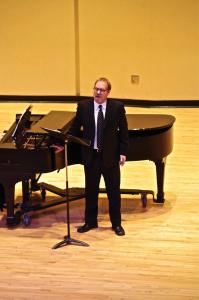 Zachary Dorsch photo: Brent Weber presented his recital entirely in German, a language full of expressive music.The Romantic Period in music has a great deal to offer in the way of emotional expression, sometimes to the point of cloying. Even so, when beautiful poetry and expressive melodic lines are combined with a strong voice, the result can never fail to impress.
Zachary Dorsch photo: Brent Weber presented his recital entirely in German, a language full of expressive music.The Romantic Period in music has a great deal to offer in the way of emotional expression, sometimes to the point of cloying. Even so, when beautiful poetry and expressive melodic lines are combined with a strong voice, the result can never fail to impress.
Such was certainly the case on Thursday, Feb. 2, when Assistant Professor of Voice Brent Weber charmed his audience with a stellar performance of German Lieder.
Lieder is a genre of German song arranged for voice and piano.
The program consisted of a series of German songs by composers used to express some of the more potent emotions of the human experience, especially love.
The works were enhanced by the wonderful and sensitive accompaniment of Shirley Yoo, Ph.D., on the piano.
The evening started off with a gorgeous cycle of songs by Beethoven, called “An die ferne Geliebte”— To the Distant Beloved, a cycle that gives the listener all of the feelings of one aching for love that is not achievable.
Beethoven, though not quite a Romantic composer, clearly leads the way into the Romantic state of music by way of his chromatic lines; however, his fairly symmetrical cadences clearly show him to have one foot in the prior Classical period as well.
Following this was a cycle of songs by Louis Spohr titled “Sechs Lieder,” or Six Songs, which while also dealing with love, were differently lyrical than the first, and evoked a great deal of natural imagery.
Barton Samuel Rotberg, Ph.D., played a violin along with the piano, and while the violin added something to the lyricism of the works, it may have been a touch overpowering at times. Still, the trio did not fail to delight listeners.
Freshman Andrea Seguin said, “The violin added context, depth and interest to the pieces.”
The most interesting aspect of Spohr’s cycle was a different interpretation of Johann Wolfgang von Goethe’s poem Der Erlkönig, as many musicians are already familiar with Schubert’s interpretation of the same poem.
This version was dark and moving just as Schubert’s version, and Weber’s voice was perfectly instilled with the emotions of each of the four characters in the poem.
The final cycle in the concert, sung after a short intermission, was a collection titled “Lieder eines fahrenden Gesellen,” or Songs of a Wayfarer by Gustav Mahler.
These works proved to be a surprisingly different end to the concert; while they were still clearly in the spirit of lieder in their subject their imagery, the use of onomatopoeia and the sharp, quick transitions between feelings of love and feelings of pain provided a shocking and pleasing end to the concert.
Weber’s expressiveness added to the audience’s enjoyment immensely.
Junior Louise Wiest said, “I thought his emotion was appropriate, and he shows a lot of control with dynamics, which makes it exciting. I think it’s a great example of what a wonderful vocalist he is.”
Faculty recitals at Mercyhurst are always gems to be marveled at. But because of the subject matter and the skill of Weber’s voice, this was a particularly stirring performance the likes of which our university would undoubtedly like to experience more often.






